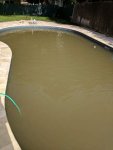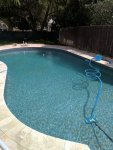Long time lurker, rare poster.
I was doing some reading through various old posts her and it seems like there is a general dislike for things like flocculent and clarifier. Why is everyone so against it? Does it do something bad to the pool? Is it more of a money/time thing?
I ask, because I recently tried out flocculent for the first time due to having a couple major storms that flooded some serious amounts of water and dirt into my pool, and I was getting tired of waiting for it to clear it up.
All season i have been running a amazingly clear pool and chemistry has been amazing. I have only had to adjust the PH 1 time (before this issue) the whole season. The only thing I have had to do was add a gallon of bleach each day to maintain chlorine levels.
However, about a month ago I had a pretty good rain storm that washed a ton of dirt into the pool and made it look like a pond. Outside of having to adjust the PH a little bit, everything was still good from the chemical perspective. I ran the filter/pump 24/7 to try and clear out the pool. It took a solid week and a half before it looked even remotely clear. Then we had another major rain and it did the same thing. I didn't want to wait to wait another week and a half to clear the pool so I put some flocculent in the other day and it worked great! The pictures below are 36 hours apart. The only time I had to spend was about 30 minutes vacuuming the floor 2 separate times.
If the difference between having a gross pool for almost 2 weeks (more if you have another storm) and $15-20 for flocculent and an hour of labor. I'd take the 2nd choice any day. Also its not like running a pool pump 24/7 for 2 weeks is free.


I was doing some reading through various old posts her and it seems like there is a general dislike for things like flocculent and clarifier. Why is everyone so against it? Does it do something bad to the pool? Is it more of a money/time thing?
I ask, because I recently tried out flocculent for the first time due to having a couple major storms that flooded some serious amounts of water and dirt into my pool, and I was getting tired of waiting for it to clear it up.
All season i have been running a amazingly clear pool and chemistry has been amazing. I have only had to adjust the PH 1 time (before this issue) the whole season. The only thing I have had to do was add a gallon of bleach each day to maintain chlorine levels.
However, about a month ago I had a pretty good rain storm that washed a ton of dirt into the pool and made it look like a pond. Outside of having to adjust the PH a little bit, everything was still good from the chemical perspective. I ran the filter/pump 24/7 to try and clear out the pool. It took a solid week and a half before it looked even remotely clear. Then we had another major rain and it did the same thing. I didn't want to wait to wait another week and a half to clear the pool so I put some flocculent in the other day and it worked great! The pictures below are 36 hours apart. The only time I had to spend was about 30 minutes vacuuming the floor 2 separate times.
If the difference between having a gross pool for almost 2 weeks (more if you have another storm) and $15-20 for flocculent and an hour of labor. I'd take the 2nd choice any day. Also its not like running a pool pump 24/7 for 2 weeks is free.



